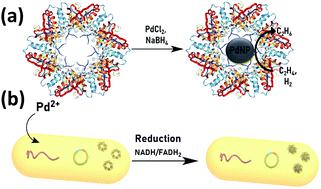当前位置:
X-MOL 学术
›
Chem. Commun.
›
论文详情
Our official English website, www.x-mol.net, welcomes your
feedback! (Note: you will need to create a separate account there.)
In vivo and in vitro protein mediated synthesis of palladium nanoparticles for hydrogenation reactions.
Chemical Communications ( IF 4.3 ) Pub Date : 2020-08-03 , DOI: 10.1039/d0cc04812g Oren Bachar 1 , Matan Moshe Meirovich 1 , Ronni Kurzion 1 , Omer Yehezkeli 2
Chemical Communications ( IF 4.3 ) Pub Date : 2020-08-03 , DOI: 10.1039/d0cc04812g Oren Bachar 1 , Matan Moshe Meirovich 1 , Ronni Kurzion 1 , Omer Yehezkeli 2
Affiliation

|
We report the biosynthesis of size confined palladium nanoparticles (Pd-NPs). The 2–3 nm size Pd-NPs were grown in 12-mer protein stable protein 1 (SP1), which serves as a template for the NP formation. We further show that by controlling the protein expression levels in the cells we can alter the cells’ catalytic activity. The in vivo grown Pd-NPs were utilized in a hydrogenation reaction, converting acetylene feedstock into ethylene and ethane. The presented concept can be further used for a wide range of applications by exploiting the synergetic effect of the biotic elements with the abiotic ones.
中文翻译:

体内和体外蛋白质介导的钯纳米粒子合成用于氢化反应。
我们报告了尺寸受限的钯纳米粒子(Pd-NPs)的生物合成。2–3 nm大小的Pd-NPs在12-mer蛋白稳定蛋白1(SP1)中生长,该蛋白可作为NP形成的模板。我们进一步表明,通过控制细胞中蛋白质的表达水平,我们可以改变细胞的催化活性。在体内生长的Pd纳米粒被用在氢化反应中,乙炔原料转化成乙烯和乙烷。通过利用生物元素与非生物元素的协同作用,提出的概念可以进一步用于广泛的应用。
更新日期:2020-09-24
中文翻译:

体内和体外蛋白质介导的钯纳米粒子合成用于氢化反应。
我们报告了尺寸受限的钯纳米粒子(Pd-NPs)的生物合成。2–3 nm大小的Pd-NPs在12-mer蛋白稳定蛋白1(SP1)中生长,该蛋白可作为NP形成的模板。我们进一步表明,通过控制细胞中蛋白质的表达水平,我们可以改变细胞的催化活性。在体内生长的Pd纳米粒被用在氢化反应中,乙炔原料转化成乙烯和乙烷。通过利用生物元素与非生物元素的协同作用,提出的概念可以进一步用于广泛的应用。











































 京公网安备 11010802027423号
京公网安备 11010802027423号